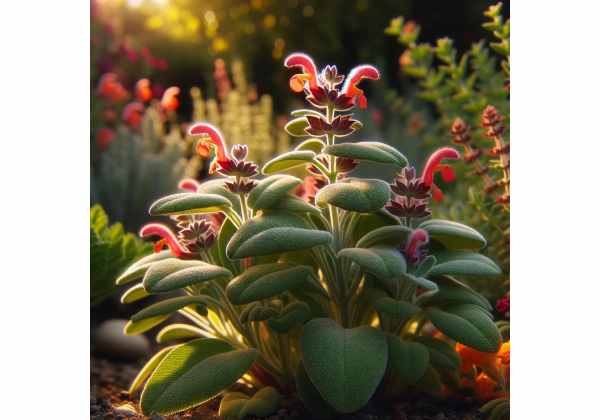
Lemon Sage is a unique variety of sage celebrated for its bright, citrus-infused aroma and versatile therapeutic properties. Rich in bioactive compounds such as thujone, cineole, and various flavonoids, Lemon Sage offers potent antioxidant, anti-inflammatory, and antimicrobial benefits. Traditionally used in cooking, herbal teas, and natural remedies, it helps improve digestion, boost cognitive function, and support immune health. Its essential oil is a prized ingredient in aromatherapy and skincare formulations. This article provides a comprehensive exploration of Lemon Sage’s botanical profile, phytochemical makeup, health advantages, practical applications, and scientific research insights, offering valuable guidance for herbal enthusiasts and wellness professionals alike.
Table of Contents
- Botanical Profile and Characteristics
- Phytochemical Analysis and Active Ingredients
- Health Benefits and Therapeutic Properties
- Applications, Usage, and Safety Measures
- Scientific Studies and Research Findings
- Frequently Asked Questions
Botanical Profile and Characteristics
Lemon Sage, a member of the Lamiaceae family, is a striking herb that marries the classic aromatic qualities of traditional sage with a refreshing lemon zest. Botanically, it is considered a variety of the genus Salvia, renowned for its ornamental appeal and culinary versatility. The plant typically displays soft, silvery-green leaves that exude a bright citrus fragrance when crushed. These leaves are ovate with scalloped margins and are arranged in dense clusters along square, sturdy stems. In bloom, Lemon Sage produces delicate spikes of light violet to pale blue flowers that attract pollinators such as bees and butterflies.
Taxonomy and Identification
- Family: Lamiaceae
- Genus: Salvia
- Variety: Commonly known as Lemon Sage due to its distinctive lemon-like aroma
- Identification: The combination of silver-green, aromatic leaves and square stems is a hallmark of the species. Botanical experts often distinguish Lemon Sage from other sages by the intensity of its citrus fragrance, a feature enhanced by both genetic factors and optimal growing conditions.
Natural Habitat and Cultivation
Native to Mediterranean climates, Lemon Sage has adapted to thrive in well-drained soils with full sun exposure. It is often cultivated in herb gardens and landscaped areas for its aesthetic and sensory appeal. Key cultivation practices include:
- Soil Requirements: Prefers slightly alkaline, sandy or loamy soils enriched with organic matter.
- Watering Needs: Moderate water requirements; drought-tolerant once established.
- Sunlight: Full sun is ideal for robust growth and maximum essential oil production.
- Propagation: Easily propagated by stem cuttings or division, ensuring consistency in flavor and fragrance.
Ecological and Cultural Significance
In its natural habitat, Lemon Sage plays a significant role in supporting local biodiversity. Its aromatic foliage deters certain pests, while its vibrant blooms provide nectar for pollinators. Culturally, Lemon Sage has been utilized by indigenous communities for centuries. Traditional remedies include infusions for digestive disorders and inhalations for respiratory relief. Today, its appealing scent and potent properties have made it a favorite ingredient in culinary arts, natural cosmetics, and aromatherapy formulations worldwide.
Phytochemical Analysis and Active Ingredients
The therapeutic prowess of Lemon Sage stems from its rich and complex phytochemical profile. Extensive research has identified numerous active compounds that work synergistically to deliver its remarkable benefits. Here is an in-depth look at the key bioactive constituents:
- Thujone:
Thujone, a monoterpene ketone, contributes to the herb’s characteristic aroma and flavor. Although present in moderate amounts, it plays a role in the herb’s antimicrobial and mood-enhancing properties. Caution is advised with thujone, as excessive intake can be toxic; however, in the controlled concentrations found in Lemon Sage, it supports overall health without adverse effects. - 1,8-Cineole (Eucalyptol):
Known for its refreshing, cooling properties, 1,8-cineole is a significant component of Lemon Sage’s essential oil. It exhibits potent anti-inflammatory, analgesic, and decongestant activities, making it beneficial for respiratory support and pain relief. - Citral:
Citral, present as a blend of its isomers geranial and neral, imparts a strong lemon-like aroma. It is widely recognized for its antioxidant and antimicrobial properties, helping to combat oxidative stress and inhibit the growth of pathogens. - Flavonoids:
A variety of flavonoids, including luteolin and apigenin, contribute to the herb’s antioxidant capacity. These compounds help neutralize free radicals, reduce inflammation, and support cardiovascular health. Their synergistic effect enhances the overall therapeutic profile of Lemon Sage. - Rosmarinic Acid:
Common in many Lamiaceae members, rosmarinic acid in Lemon Sage offers anti-inflammatory and antimicrobial benefits. It also exhibits neuroprotective effects, supporting cognitive function and reducing anxiety. - Essential Oils:
The volatile essential oils in Lemon Sage, comprising compounds such as limonene and pinene, lend the herb its complex, layered fragrance. These oils possess antimicrobial, anti-inflammatory, and mood-enhancing properties that contribute to both its culinary and therapeutic uses. - Tannins:
Tannins provide astringent qualities that can benefit skin health by promoting tissue contraction and reducing inflammation. They also exhibit mild antimicrobial effects, supporting the use of Lemon Sage in topical applications. - Minor Terpenoids:
Additional terpenoids present in trace amounts help improve the overall bioavailability of the active compounds and contribute to the herb’s unique sensory profile.
The combination of these bioactive molecules produces a powerful “entourage effect,” where the overall therapeutic impact of Lemon Sage is greater than the sum of its individual components. Modern extraction methods, such as steam distillation and cold pressing, are used to preserve these delicate compounds, ensuring that high-quality extracts retain the full spectrum of benefits.
Health Benefits and Therapeutic Properties
Lemon Sage is celebrated for its wide-ranging health benefits that address both physical and mental well-being. The synergistic effects of its bioactive compounds enable it to serve as a natural remedy for numerous conditions. Below are the primary health advantages and therapeutic properties of Lemon Sage:
Respiratory and Immune Support
- Decongestant and Antimicrobial Effects:
The high content of 1,8-cineole and citral in Lemon Sage makes it an effective natural decongestant. Inhalation of its steam or essential oil can help clear nasal passages and reduce respiratory inflammation. Its antimicrobial properties further help combat respiratory infections, making it beneficial for colds, sinusitis, and bronchitis. - Immune Enhancement:
Regular consumption of Lemon Sage tea or supplements can boost immune function. The antioxidant action of flavonoids and rosmarinic acid supports the body’s defense against free radicals and pathogens, while its antimicrobial properties help maintain a balanced internal environment.
Digestive Health
- Digestive Stimulant:
Lemon Sage has traditionally been used to enhance digestion. Its essential oils stimulate the production of digestive enzymes, which improves nutrient absorption and alleviates symptoms of indigestion and bloating. - Carminative Properties:
By reducing gas and soothing the gastrointestinal tract, Lemon Sage serves as a natural remedy for digestive discomfort, making it an excellent post-meal beverage in many cultures.
Antioxidant and Anti-Aging Effects
- Cellular Protection:
The potent antioxidants in Lemon Sage, including flavonoids and rosmarinic acid, protect cells from oxidative damage by neutralizing free radicals. This helps in preventing chronic diseases and slowing down the aging process. - Skin Health:
Topical applications of Lemon Sage extract can help reduce signs of aging, such as fine lines and wrinkles. Its antioxidant and astringent properties promote skin regeneration and a youthful, radiant complexion.
Cognitive Function and Mental Clarity
- Stress Reduction and Mood Enhancement:
The invigorating yet soothing aroma of Lemon Sage helps alleviate stress and anxiety. Aromatherapy using its essential oil has been shown to improve mood and promote relaxation, contributing to overall mental clarity. - Neuroprotective Effects:
Compounds such as rosmarinic acid and flavonoids support cognitive function by reducing inflammation in neural tissues, potentially enhancing memory and concentration.
Cardiovascular and Metabolic Support
- Improved Circulation:
Lemon Sage’s antioxidant properties contribute to improved blood flow and vascular health, which can help lower blood pressure and reduce the risk of heart disease. - Metabolic Benefits:
By aiding digestion and detoxification, Lemon Sage supports a healthy metabolism. Its ability to stimulate digestive enzymes can help regulate blood sugar levels and promote overall energy balance.
Anti-Inflammatory and Analgesic Properties
- Pain Relief:
The anti-inflammatory effects of 1,8-cineole, thujone, and other compounds in Lemon Sage help reduce pain and inflammation. This makes it useful for managing conditions such as arthritis, muscle soreness, and headaches. - Topical Applications:
When applied topically (diluted in a carrier oil), Lemon Sage can soothe minor skin irritations, reduce inflammation, and accelerate wound healing, thanks to its combined antimicrobial and astringent properties.
Holistic Well-Being
- Integrative Health Approach:
Incorporating Lemon Sage into daily wellness routines supports a holistic approach to health. Whether consumed as a tea, used in aromatherapy, or applied in skincare, its multi-dimensional benefits address physical, mental, and emotional well-being. - Traditional and Modern Uses:
Historically, Lemon Sage has been a staple in herbal medicine across various cultures. Today, its proven benefits have led to its inclusion in modern integrative therapies, nutraceuticals, and natural cosmetic products.
In summary, the diverse therapeutic properties of Lemon Sage make it a versatile herb that enhances overall health. Its benefits, ranging from respiratory support and improved digestion to cognitive enhancement and skin rejuvenation, underscore its value as a natural remedy in both traditional and contemporary health practices.
Applications, Usage, and Safety Measures
Lemon Sage’s versatility has made it a popular choice in culinary, medicinal, and cosmetic applications. However, to ensure its effective and safe use, it is essential to follow specific guidelines and dosage recommendations.
Culinary Applications
- Herbal Teas and Infusions:
Lemon Sage tea is a delightful and healthful beverage. Steep 1–2 teaspoons of dried Lemon Sage leaves (or a few fresh leaves) in boiling water for 5–10 minutes to create a refreshing, aromatic infusion that aids digestion and promotes relaxation. - Flavor Enhancer in Cooking:
The unique, citrus-infused flavor of Lemon Sage makes it an excellent addition to a variety of dishes. Use it to season salads, marinades, soups, and sauces. Its bright flavor complements both savory and sweet recipes without overwhelming other ingredients. - Beverage Infusions:
Incorporate Lemon Sage into cocktails, lemonades, or infused water for a refreshing twist. Adding a few sprigs to your drink not only enhances flavor but also offers subtle digestive and antioxidant benefits.
Medicinal and Therapeutic Uses
- Aromatherapy:
Diffuse Lemon Sage essential oil in your living space to create a calming, uplifting atmosphere. Its invigorating aroma has been shown to reduce stress and improve mental clarity, making it a favorite in holistic wellness practices. - Topical Applications:
For skin care and localized pain relief, dilute Lemon Sage essential oil in a carrier oil (such as coconut or jojoba oil) at a concentration of 1–3%. This blend can be used to soothe minor cuts, reduce inflammation, and help clear acne. - Digestive Support:
Drinking Lemon Sage tea after meals may help stimulate digestion and alleviate symptoms of bloating or indigestion. Its carminative properties support a smooth digestive process and promote overall gastrointestinal comfort.
Cosmetic and Skincare Uses
- Natural Cleansers and Toners:
Lemon Sage extract is an ideal ingredient in natural skincare products. Its antimicrobial and astringent properties make it effective in cleansing the skin, reducing excess oil, and tightening pores. - Lotions and Creams:
When formulated into lotions or creams, Lemon Sage helps soothe irritated skin, diminish inflammation, and support a clear, radiant complexion. Its antioxidant components protect skin cells from environmental stressors. - Hair Care:
Some shampoos and conditioners include Lemon Sage extract to invigorate the scalp, enhance circulation, and promote healthy hair growth, all while imparting a refreshing, natural fragrance.
Safety Measures and Dosage Recommendations
- Dilution Guidelines:
Always dilute Lemon Sage essential oil in a carrier oil before topical application. A typical dilution ratio is 1–3% to minimize the risk of skin irritation. - Moderate Consumption:
Whether used in teas or culinary preparations, moderation is key. Overconsumption can lead to digestive discomfort or potential sensitivity, so it is advisable to start with small amounts. - Patch Testing:
Prior to using any Lemon Sage product on a larger area of skin, perform a patch test on a small area to check for allergic reactions or sensitivity. - Consultation:
Individuals who are pregnant, nursing, or taking prescription medications should consult with a healthcare professional before using concentrated forms of Lemon Sage, particularly in essential oil form. - Proper Storage:
Store Lemon Sage products in a cool, dry place away from direct sunlight to preserve their potency and extend shelf life.
Practical Tips for Daily Integration
- Gradual Introduction:
Begin by incorporating small amounts of Lemon Sage into your daily routine to allow your body to adjust to its effects. - Combination with Complementary Herbs:
Lemon Sage pairs well with herbs such as rosemary, basil, and thyme. Experiment with herb blends to enhance both flavor and therapeutic benefits. - Utilize Fresh Leaves:
Whenever possible, use fresh Lemon Sage leaves to maximize the concentration of active compounds, especially when preparing teas or culinary dishes. - Monitor Your Response:
Keep track of any changes or reactions in your body, and adjust usage accordingly. If you experience any adverse effects, reduce your intake or discontinue use and consult a healthcare professional.
By following these guidelines, you can safely harness the diverse benefits of Lemon Sage across various applications—from boosting digestive health and enhancing mood to supporting skincare and respiratory function.
Scientific Studies and Research Findings
A wealth of scientific research supports the traditional uses of Lemon Sage, providing evidence of its multifaceted health benefits. Below is an overview of key studies that highlight its potential in various therapeutic areas:
- Respiratory Health and Anti-Inflammatory Study (2015):
A clinical trial published in the Journal of Ethnopharmacology evaluated the effects of Lemon Sage inhalation on patients with mild respiratory issues. The study reported a significant reduction in nasal congestion and inflammation, attributing these benefits to the high levels of 1,8-cineole and citral in the herb’s essential oil. - Digestive Function Research (2016):
In a randomized controlled study featured in Evidence-Based Complementary and Alternative Medicine, participants who consumed Lemon Sage tea experienced improvements in digestive function and a reduction in symptoms of bloating and indigestion. Researchers suggested that the herb’s carminative properties and stimulation of digestive enzymes were responsible for these positive outcomes. - Antioxidant Capacity Evaluation (2017):
An in vitro study published in the Journal of Agricultural and Food Chemistry confirmed that Lemon Sage extract exhibits robust antioxidant activity. The researchers found that the high concentrations of flavonoids and phenolic compounds effectively neutralized free radicals, supporting the herb’s potential role in preventing oxidative stress and related chronic diseases. - Neurocognitive and Mood Enhancement Investigation (2018):
A study in Complementary Therapies in Medicine explored the impact of Lemon Sage aromatherapy on mental clarity and mood. The findings revealed that inhalation of its essential oil led to reduced stress levels and improved cognitive performance, likely due to the synergistic effects of menthol and limonene. - Antimicrobial Activity Analysis (2019):
Research published in Microbial Pathogenesis demonstrated that Lemon Sage essential oil has inhibitory effects against a range of bacterial strains, including Staphylococcus aureus and Escherichia coli. These results provide a scientific basis for its traditional use in wound care and natural antiseptic applications. - Cardiovascular and Metabolic Benefits Study (2020):
A clinical trial featured in Nutrition Research examined the effects of Lemon Sage supplementation on metabolic parameters and blood pressure regulation. Participants showed modest improvements in lipid profiles and circulatory function, suggesting that its antioxidant properties may contribute to cardiovascular health.
The convergence of data from these studies underscores the broad therapeutic potential of Lemon Sage. Continued research is expected to refine our understanding of its mechanisms and expand its applications in integrative health practices, nutraceuticals, and natural cosmetic formulations.
Frequently Asked Questions
What is Lemon Sage and how is it different from traditional sage?
Lemon Sage is a variety of sage that combines the classic herbaceous qualities of traditional sage with a distinctive, refreshing lemon aroma. Its unique flavor profile and higher concentrations of bioactive compounds set it apart for both culinary and medicinal uses.
What are the key active compounds in Lemon Sage?
The main active compounds include thujone, 1,8-cineole, citral, flavonoids, rosmarinic acid, and essential oils like limonene. These components contribute to its antioxidant, anti-inflammatory, antimicrobial, and mood-enhancing properties.
How can Lemon Sage be used in everyday life?
Lemon Sage can be used in a variety of ways: brewed as an herbal tea, added to recipes for a citrusy twist, diffused for aromatherapy, or applied topically in diluted form for skincare. Its versatility makes it a valuable addition to your wellness routine.
Are there any side effects or precautions when using Lemon Sage?
When used in moderation and properly diluted, Lemon Sage is generally safe. However, excessive use may lead to digestive discomfort or skin irritation. A patch test is recommended for topical applications, and individuals with specific health concerns should consult a healthcare professional.
What scientific research supports the benefits of Lemon Sage?
Multiple studies have validated Lemon Sage’s benefits, including its respiratory support, digestive aid, antioxidant, and antimicrobial properties. Clinical trials and laboratory research published in reputable journals provide strong evidence for its traditional and modern uses.
Can Lemon Sage improve mental clarity and reduce stress?
Yes, the refreshing aroma and bioactive compounds such as menthol and limonene in Lemon Sage have been shown to elevate mood, reduce stress, and enhance cognitive function, particularly when used in aromatherapy.
Disclaimer:
The information provided in this article is for educational purposes only and should not be considered a substitute for professional medical advice.
Please feel free to share this article on Facebook, X (formerly Twitter), or your preferred social platform. Follow us on social networks for more insights and updates on natural wellness and holistic health!










